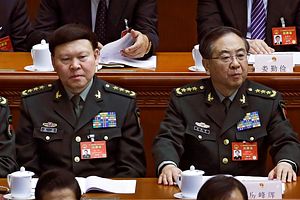Zhang Yang, a former member of Chinese Central Military Commission (CMC) — the highest body that oversees the Chinese military — “hung himself at home” on the morning of November 23. He is the highest-ranking military official to commit suicide under the anti-corruption campaign launched by Chinese President Xi Jinping.
China’s state news agency Xinhua announced Zhang’s suicide in a brief statement on November 28.
The statement said that before his death, Zhang was under Party investigation for his links to Guo Boxiong and Xu Caihou (the two highest ranking military officials to have been brought down under the anti-corruption campaign).
The investigation, approved by the Central Party Committee and the CMC, found that Zhang had committed “serious violations of discipline and the law and was suspected of the crimes of bribery as well as holding huge amounts of assets for which the sources are unknown,” the statement said.
Zhang was living at home while he was being investigated, Xinhua added.
As The Diplomat reported earlier, Zhang, 66, had held the position of director of the military Political Work Department — the chief political organ under the CMC. After disappearing from public view since May, Zhang was confirmed to be excluded from the 19th National Congress of the Chinese Communist Party in September — an apparent signal of his being removed from power.
Together with Zhang, General Fang Fenghui, former chief of the PLA’s Joint Staff Department, was the other senior military official who was excluded from the Congress.
Regarding Zhang’s suicide, the Chinese authorities’ attitude is particularly worth noting.
The military’s official mouthpiece, the People’s Liberation Army Daily, published a commentary on Zhang’s death under the title of “Using suicide to get away from punishment is unacceptable; anti-corruption will never stop.” The article used the pseudonym of “Jun Zheng Ping,” which actually stands for “the commentary of Political Work Department.”
The article sharply commented: “Zhang Yang committed suicide for fear of punishment! The once-powerful general ended his life in such a shameful way.”
The commentary also referred to Zhang as a “typical double-faced man,” because he had “lost faith [in Communism], the principles of the Party, the fear of law, and moral standards.” Zhang “shouted his loyalty in appearance and committed corruption” behind the scenes, the article said.
The commentary also repeatedly emphasized that the military will carry on the anti-corruption campaign and follow Xi’s leadership without hesitation.
As The Diplomat has been following, since the close of the 19th Party Congress, Xi has been centralizing his personal power over the military as well as the whole Party. Meanwhile, the military has been constantly calling for “eliminating the baneful influence of Guo and Xu,” as the two former senior officials had controlled the Chinese military for more than a decade. Zhang apparently has been categorized by the Chinese authorities as a part of Guo and Xu’s “baneful influence.” His suicide will likely prompt the CMC to launch another round of declarations of loyalty to Xi within the military.

































